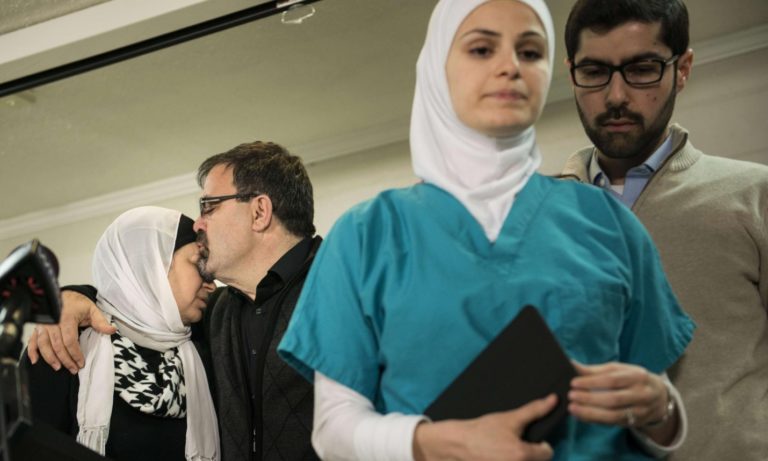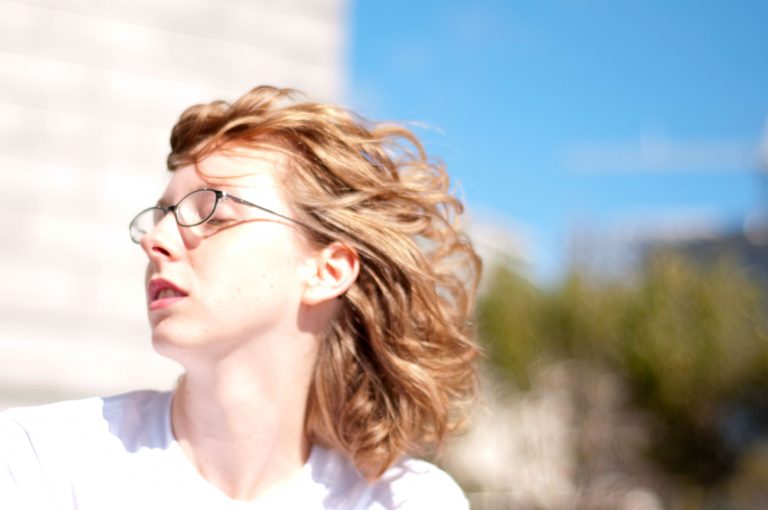
Image by Brendan Smialowski.
Letting Our Suffering Speak and Be Public
God is with the brokenhearted. I sure hope so, because there is a grief that no human being alone can bear.
My eyes hurt from weeping. The more I learn about the three beautiful young Muslims who were savagely killed on Tuesday in Chapel Hill, the more my heart aches for them, for their families, for our community here in North Carolina, and for us as a human community.
Maybe it’s because I am a parent, I start with their parents. I cannot imagine their grief, their pain. We are who we are because somebody loved us, somebody sacrificed for us. These three beautiful, young souls — Deah Barakat, Yusor Abu-Salha, and Razan Abu Salha — were who they were because their families, the Barakat family and the Abu-Salha family loved them.
And I mourn us as a human community, because I see that decades of love and sacrifice that went into making them who they were can be silenced by the hateful violent actions of a deranged man with a gun in a few minutes. There seems to be something fundamentally wrong, not just with the fact that young people this beautiful are taken from us so soon, but that in a few minutes violence and hatred seem to gain the upper hand over decades of love.
I want to believe, I choose to believe that the arc of the moral universe is long but it bends towards justice. I want to believe that light overcomes darkness and that hatred is bound to vanish before love. These nights make it harder to hang on to that faith.
Hate, violence, and bullets have had their say. Now it’s up to all of us to see how we are going to respond.
These three young people already understood one of the most powerful lessons of life: that we have to keep connecting the suffering “here” to the suffering “there,” because the humanity here at home already mingles with the humanity over there. Deah, the charming young man with the effervescent smile worked at both the local and the global levels.

His last Facebook post shows him in Durham offering a free dental clinic and handing out food for underprivileged communities. He also mobilized people to provide relief for Syrian refugees in Turkey. Here is a beautiful YouTube video showing Deah on the Syrian dental relief project called Refugee Smiles:
Deah’s wife, Yusor, carried on dental relief work among Syrian refugees herself in the city of Kilis, Turkey. I am haunted by this picture of her dancing with her father, during her wedding with Deah, which was just six weeks ago.
Razan, Yusor’s sister, was a talented 3-D designer studying at one of the top engineering schools in the country. She was also a gifted artist who put together an amazing project to engage and inspire Muslims titled “Optimism is a Lost Sunnah”:
You learn most about people not by where they stand not in times of comfort but rather by where they stand in times of crisis. And if you want to see an image of people whose faith and strength carries them through unbearable crises, watch the families of these beautiful souls. I urge you to listen to the older sister of Deah, Suzanne Barakat on the dedication of these “three incredibly brilliant, bright, beautiful young people” during her interview with CNN:
In this case, I tend to listen to what the father of the two murdered women, Dr. Mohammad Abu-Salha, says: “This was not a dispute over a parking space; this was a hate crime. This man had picked on my daughter and her husband a couple of times before, and he talked with them with his gun in his belt. And they were uncomfortable with him, but they did not know he would go this far.”
The health of any community is revealed by how we treat the weakest and most vulnerable people in our midst. At this particular moment in American history, Muslims are among the most vulnerable communities. We do not have a monopoly on suffering. There are many vulnerable peoples including African Americans, women, gays/lesbians, undocumented people, poor people, and more (and the overlaps among the above). But Muslims are surely among the very vulnerable communities among us, one of the few communities who are routinely demonized by mainstream media.
It is not the job of marginalized people to heal the prejudice of others. It is not the responsibility of vulnerable young Muslim students to heal the Islamophobia of others. It is up to all of us to reach out to one another and uplift all of us.
The great theorist Adorno once said, “The need to let suffering speak is a condition of all truth.” The communities of the University of North Carolina and North Carolina State University came together to let their suffering speak. We held a vigil in which family members and loved ones spoke, remembered, and honored the three victims. We wept. We prayed. We let our suffering be public; we let our suffering speak. May that suffering indeed lead us to a greater truth, a truth that says acts of hate and violence can kill a life, but it cannot kill what gave meaning and beauty to those lives.

This is how the civil rights movement got its origin: Emmett Till’s mother, Mamie, made the bold decision to hold an open casket funeral in 1955, and let the whole world see her baby’s suffering. I am not calling for anyone to hold an open casket funeral, but I do think it’s powerful and vital that we as Muslims let people see our suffering in public. May it be this leads to an origin for a new civil rights movement, one that will lead us to deal with new injustices and oppressions in our midst.
In some ways, this vile and heinous crime is the strange fruit of 15 years of the demonization of Islam and Muslims from the most public airwaves in this country. It’s a vicious combination: repeated dehumanization of Muslims and association of Islam with the worst of violence on one hand, and the sad reality of America being a nation with 300 million guns for 300 million people. It doesn’t take a systematic institution or movement to produce this kind of violence, only a few people here and there who “snap” and actualize the violence that is in our public discourse. That broader discourse of Islamophobia — along with sexism, racism, assault on the poor — has to be addressed now.
Here’s what I hope. The best way I can think of to honor the lives of Deah, Yusor, and Razan is to commit ourselves to loving one another, suffering together, working together so that we always remember that:
Knowledge is more luminous than ignorance
Justice is more beautiful than tyranny
Love is more divine than hatred.

